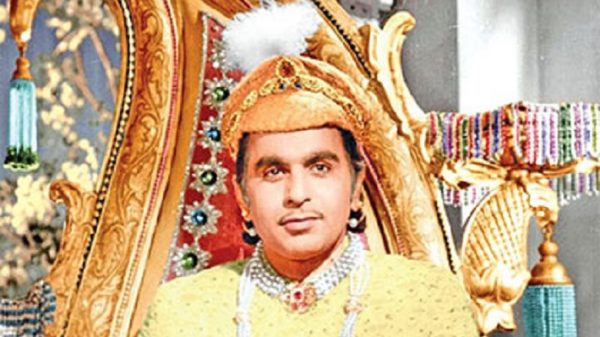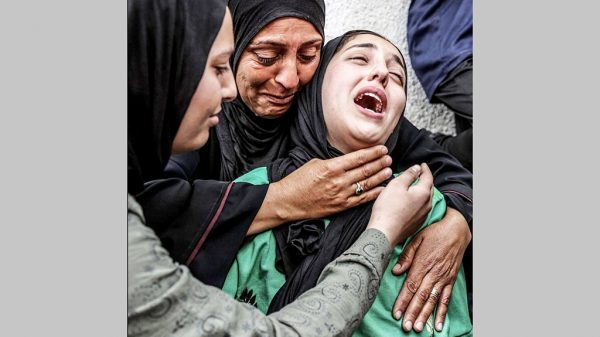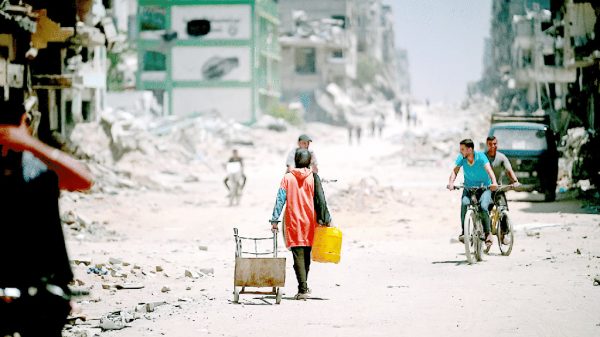‘Àfsos hum na honge’

Abdul Mannan:
‘Ye Zindagi ke mela, Dunniya mein kam na honge, Afsos hum na honge’ (There will be lots of merry moments in this word and sadly I will not be there), a line from the Hindi film ‘Mela’ (1948) starring Dilip Kumar and Nargis. Dilip Kumar (Mohammad Yusuf Khan) the greatest Indian Bollywood star ever breathed his last on the morning of Wednesday at the age of 98 in Mumbai and was buried in the evening ending a golden era of Hindi movies. It is unlikely that Indian film industry will have another star of the height Dilip Kumar left behind. He was one of the heroes of our time and my generation grew up watching his movies. He acted in only 63 movies and these 63 movies have made him not only immortal in the Hindi movie world but also transformed him into a legend of India’s movie industry. The song mentioned was sung in the film ‘Mela’ by another maestro Mohammad Rafi who died on July 31, 1980. While doing a running commentary India’s Doordarshan played the song in the background and made any one who watched the funeral procession on TV emotional. Both of them were commonly known as Rafi Saab and Dilip Saab because of their personality and stature. All performers in any movie industry do not make to become legends but both Rafi Saab and Dilip Saab not only became legends but their names will remain immortal in the movie world of the sub-continent and beyond. Dilip Kumar was an institution by himself. His movie career spanned over five decades starting in 1944 with the film ‘Jawar Bhata’ his last film being Qila in 1991. It is said that Bollywood’s superstar Amitabh Bachchan had to wait 46 years to get Dilip Kumar’s autograph.
Dilip Kumar was born on 11 December 1922 to a Hindko (a local dialect spoken by a large section of people in present day Khyber Pakhtunkhwa in Pakistan) speaking Pathan family at his family home in the famous Qissa Khawani Bazar of Peshawar. Qissa Khawani Bazar was known for its book shops, publishers, sweet shops and as the legend goes there was a time when people would gather around professional story tellers to listen to stories (Qissa Khawani). Khan Abdul Gaffar Khan known as Frontier Gandhi was born here and led the Indian independence movement from the front but never supported Jinnah’s Two Nation Theory. He led a political party called Khudai Khidmatagar (servants of God) and worked closely with Gandhi. I first learnt about the famous Qissa Khawani Bazar while reading Rudyard Kipling’s famous novel ‘Kim’ during my school days. It was a text in our eighth grade class. Yusuf Khan’s family moved to Bombay in 1930’s and his father who was a fruit merchant set up his business there.
When Dilip Kumar entered the movie world with the film ‘Jawar Bhata’ (1944) produced by Bombay Talkies it was considered a taboo for Muslims to act in movies though in those days Lahore along with Lucknow and Delhi were the hub of cultural heritage under the patronage of Muslim elites and Nawabs. Even Dilip Kumar’s family did not approve Muslims going into movie business or entering the cultural world. When Indian movie industry graduated from silent era to talkies many of the performers came from these three cities and Bombay (present day Mumbai). Performers like Dilip Kumar and another legend Madhubala (dubbed Venus of Bollywood) had to change her name from Begum Mumtaz Jehan Dehlavi to Madhubala. Saadat Hasan Manto, a renowned Urdu short story writer in his popular book ‘Stars from Another Sky: The Bombay Film World in the 1940s’ narrated his experience as a script writer and how pained was he to see that the industry was becoming communal after the Partition. Manto himself even had to take the sad decision to migrate to Lahore soon after.
Late Dilip Kumar was a different story. Not many knew about his faith and because of his extraordinary acting talent they wouldn’t even bother. So is true for performers like Madhubala, Nargis, Waheeda Rehman. My generation grew up watching Hindi movies where not only these greats performed but also were lucky to watch movies of Ashok Kumar, Raj Kapoor, Shaym, Devanand, Premnath, Vaijayanti Mala, Meena Kumari (born as Mahjabeen Banu). Dilip Kumar was commonly known as a Tragedy King as in many of his films he had to sacrifice for different reasons the girl (heroine) he loved. The 1948 film ‘Mela’, 1955 ‘Devdas,’ 1949 ‘Andaz’ or the all-time1960 historical drama film Mughal-e-Azam all ended with the tragedy as the movie ended without the hero and the heroine falling into each other’s arms to end the movie. Till 1965 most of the Indian movies, Hindi and Bangla were released in the then East Pakistan.
Though many movies will make Dilip Kumar immortal ‘Mughal-e-Azam’ perhaps will go down in the history of Indian movies as a landmark as even in today’s market value it is the costliest movie ever to be made in Indian movie industry. In its initial realize its dance sequences were in colour and were the first black and white Hindi movie to be digitally coloured later. The new coloured version was commercially released in 2004. It is said when a ceasefire was announced during the 1965 war between Pakistan and India in a sector in Punjab the Pakistani commander later, Lt. General, Shabjada Yakub Khan sent a message to his brother on the other side of the border, Lt. General Yunus Khan commanding the Indian troops to arrange for screening the movie ‘Mughal-e-Azam’ for his troops which was arranged. The Khan brothers originally hailed from Hyderabad. Pakistan’s former foreign minister Khurshid Mahmud Kasuri revealed that when India and Pakistan was in another bout of border skirmish and artillery shelling in 1999 in Kargil heights, in the middle of a conversation between Pakistan’s Prime Minister Nawaz Sharif and India’s Prime Minister Atal Behari Vajpayee, the latter handed the phone to Dilip Saab who was nearby. Sharif did not believe it was his hero on the phone. Dilip Kumar assured him it was indeed he speaking, and he was concerned about the flare-up on the Kargil Heights. He urged Sharif to help defuse the crisis quickly as that would be the right thing to do in the interests of the people on both sides. (The Dawn, 7 October 2015).
Jugnu (1947), Daag (1952), Madhumati were amongst some of the other famous films of Dilip Kumar. Because of the success of his movies there were at least five remakes of his films, notable being Devdas, Shaheed, Amar, Andaz, and Saudagar. Impressed with Dilip Kumar’s talents the great British director David Lean offered him the role of ‘Sherif Ali’ in his movie ‘Lawrence of Arabia’ (1962), but Dilip Saab declined to perform in the movie for the reason best known to him. The role eventually went to Egyptian actor Omar Sharif. In his autobiography Dilip Kumar confessed “he thought Omar Sharif had played the role far much better than he himself could have.” Dilip Kumar’s magnanimity was unparalleled.
Dilip Saab was a member of the Rajya Sabah, the upper house of India’s Parliament from 2000 to 2006, nominated by Indian National Congress to represent Maharashtra. Dilip Kumar was also appointed as the Sheriff of Bombay in 1980 by the Governor of Maharashtra an Honorary post usually offered to social workers, professional and people with unblemished image and stature.
Dilip Kumar married another Bollywood beauty queen and film star Saira Banu in 1966 after more than a decade long affair but had a brief slip when he took a second wife Asma Sahiba from Hyderabad in1981 stunning the entire industry. However, the marriage broke up in1983. The likes of Dilip Kumar ruled the Bollywood in an era when the Hindi movie industry was dominated by other greats behind the scene stalwarts like Mehboob, K Asif, Mohammad Rafi, Nurjahan (before she migrated to Pakistan), Shamsad Begum, Naushad, Lata Mangeshkar, Shankar-Jaikishan, Laxmikant-Payrilal and few others. If not all most of them have left this world but their legacy lives for ever. The last to say good-bye was Mohammed Yusuf Khan alias Dilip Kumar. He was one Bollywood star whose demise pained not only the common people of the sub-continent but also Heads of Governments of Bangladesh, India and Pakistan. In 1994 Dilip Kumar visited Bangladesh on an invitation from the Bangladesh movie industry. He was accorded a reception in Osmani Memorial Hall where the then Prime Minister Begum Zia was present. When Dilip Kumar came on stage to speak to the people his speech was interrupted number of times by the organizers saying that though his name is Dilip Kumar his name is actually Yusuf Khan and he is a Muslim as if that mattered. In 2013 Dilip Saab performed Umrah.
Dilip Kumar left the earthly world but during his lifetime has managed transform himself from a film star to an institution. Long live the last Mughal of the Bombay Industry.
The writer is an analyst and a commentator




























Leave a Reply